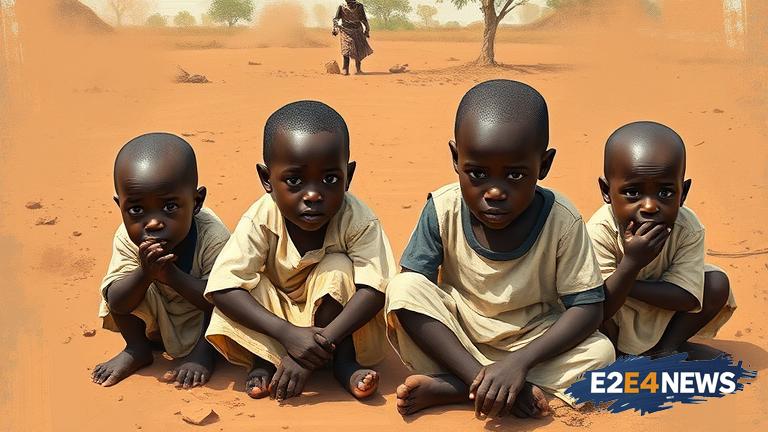The United Nations Children’s Fund (UNICEF) has issued a dire warning about the escalating starvation crisis in Sudan, where thousands of children are struggling to survive. The crisis is attributed to a combination of factors, including conflict, economic instability, and climate change. According to UNICEF, the number of malnourished children in Sudan has increased significantly over the past year, with many suffering from severe acute malnutrition. The situation is particularly dire in the western region of Darfur, where years of conflict have left millions of people displaced and without access to basic necessities like food and healthcare. UNICEF is urging the international community to take immediate action to address the crisis, including providing emergency funding and support for nutrition programs. The organization is also working to provide aid to affected families, including food, shelter, and healthcare. However, the scale of the crisis is overwhelming, and more support is desperately needed. The Sudanese government has also been criticized for its response to the crisis, with many accusing it of not doing enough to address the root causes of the problem. The international community has been called upon to provide more support, including diplomatic efforts to bring an end to the conflict in Darfur. The crisis in Sudan is not only a humanitarian issue but also a development issue, as it has the potential to undermine the country’s long-term stability and prosperity. The effects of malnutrition on children can be devastating, including stunted growth, developmental delays, and increased risk of illness and death. UNICEF is working to provide support to families, including counseling and education on nutrition and healthcare. The organization is also working to improve access to healthcare services, including vaccination programs and disease prevention. However, the crisis is not limited to Sudan, as the effects of climate change and conflict are being felt across the region. The international community must take a comprehensive approach to addressing the crisis, including providing support for affected countries and addressing the root causes of the problem. This includes investing in sustainable agriculture, improving access to healthcare and education, and promoting peace and stability in the region. The crisis in Sudan is a stark reminder of the need for urgent action to address the global hunger crisis, which affects millions of people around the world. The international community must come together to provide support and funding to address the crisis, including through organizations like UNICEF. The situation in Sudan is a humanitarian emergency that requires immediate attention and action. The world cannot afford to wait, as the lives of thousands of children hang in the balance. The crisis is a wake-up call for the international community to take action to address the root causes of hunger and malnutrition, including conflict, poverty, and climate change. By working together, we can make a difference and ensure that all children have access to the nutrition and healthcare they need to thrive. The crisis in Sudan is a complex issue that requires a comprehensive response, including emergency aid, long-term development support, and diplomatic efforts to promote peace and stability. The international community must take a coordinated approach to addressing the crisis, including through the United Nations and other international organizations. The situation in Sudan is a reminder of the importance of investing in humanitarian aid and development programs, including those focused on nutrition, healthcare, and education. By supporting these programs, we can help to prevent crises like the one in Sudan and ensure that all children have the opportunity to grow and thrive.





